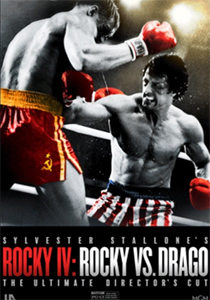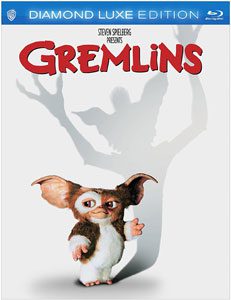“Rocky IV” (1985) is my favorite “Rocky” sequel because it’s near-perfect in what it aims to do. In chronicling Rocky’s (Sylvester Stallone) toughest and most personal test, it features the best soundtrack of all time and isn’t shy about using it. Most notably, Phil Collins’ “Easy Lover” … I mean Robert Tepper’s “No Easy Way Out” … is in full music-video (remember those?) form as Rocky reflects on his life, his losses and his uphill battle.
(SPOILERS FOLLOW.)
Bye, robot
But detractors have held that “Rocky IV” is cheesy. Every 1985 movie included a robot, but that’s no excuse for Paulie’s (Burt Young) birthday-gift robot, they say. If the goal of “Rocky IV: Rocky vs. Drago” – Stallone’s new “Ultimate Director’s Cut” – is to excise the cheese, the robot is the obvious place to start. So it’s gone.
In my first review of “Rocky IV,” I argued that the robot thematically fits because Ivan Drago (Dolph Lundgren) is a robot of sorts. But the literal robot is not necessary; the metaphor remains in place.
“Rocky IV: Rocky vs. Drago – The Ultimate Director’s Cut” (1985, 2021)
Director: Sylvester Stallone
Writer: Sylvester Stallone
Stars: Sylvester Stallone, Carl Weathers, Dolph Lundgren
After all the additions and subtractions result in a “Rocky vs. Drago” that’s 2 minutes longer than the original cut, we have a more focused and introspective film. Stallone has made “Rocky IV” slightly less fun but also slightly better.
The fighter-triangle structure remains intact, but there’s less of what Stallone considers fat: almost everything outside that triangle. By percentage, there’s now more of Apollo (Carl Weathers), Rocky and Drago. There are fewer distractions.
Adrian’s POV
That’s not to say Stallone ignores the other characters. Talia Shire’s Adrian gets a valuable new scene. In the kitchen, she says to her husband that Apollo craves the spotlight, and that blinds him to the danger of fighting Drago. This on-point amateur psychoanalysis moves Apollo’s profile from academic scholarship to blunt statement.
But it also shows that Adrian can see things more clearly than the men, who have tunnel vision. When Rocky says “Let me be a man” and risk his life against Drago, it’s not a great statement about what it means to be a man. But it’s a true statement about Rocky.
Now I think about Rocky’s line from Adrian’s perspective. I imagine that off-screen (before she shows up at Rocky’s training ranch in Siberia) she decides she can’t change Rocky. So she’ll do the next best thing: Support him. Isn’t this what every good marriage is about?
Some critics have noted that “Rocky vs. Balboa” excises too much of Robert (Rocky Krakoff here, Sage Stallone and Milo Ventimiglia later in the series). We no longer see him cheering on his dad while watching on TV, and Rocky no longer wishes him a merry Christmas in his final speech.
I’m not offended. If the removal helps the pacing and focus of the final fight, so be it. Plus, Robert’s absence from the back half ties in with his need for attention from his dad in “Rocky V.”
Friendship focus
“Rocky vs. Drago” focuses on the three men in the ring. But I should mention a fourth man: Trainer Duke (Tony Burton) gives a longer pep talk to Rocky in the Siberian cabin. Then Rocky says to Duke (rather than Adrian) that Drago will have to kill him in order to beat him.
This is an appropriate thing to say to Duke more so than Adrian. Rocky has always tried to emotionally shield Adrian. By hiding his darkest thoughts about the upcoming bout from her, he’s backsliding. But that fits with the movie’s theme: people’s struggle to change.
Rocky’s longer funeral speech emphasizes that Apollo was his best friend, the one person who gave him a shot (to change his career for the better). In fact, that friendship is emphasized out of the gates when Stallone repurposes the end of “Rocky III” as the start of “Rocky IV” – not merely as a story recap but now as a statement of tone and focus.
Like “Rocky III,” “Rocky IV” is about the friendship, but now it’s about the tragic side. Apollo and Rocky can’t shake their boxing addiction, and Rocky can’t be Apollo’s guide. He’s an enabler.
The rise of Drago
The biggest benefit of the director’s cut, though, is to Drago’s character. The core question in both versions is: Is he more machine or man? In the 1985 cut, he’s more machine. In the 2021 cut, he’s more man. He screams his own name twice before Apollo’s corpse has even been removed from the ring.
In neither cut does he say his country’s name. And Stallone achieves addition-by-subtraction by removing Ludmilla (Bridgette Nielsen) speaking “for” Ivan. This makes them more of a traditional couple, and it fits with the new moment at the end where Ludmilla comforts Ivan. This also plays as a commonality with Rocky’s loving marriage, whereas before this Rocky and Drago are framed in contrasts.
Drago has self-awareness throughout this cut. In “Rocky vs. Drago,” only one Soviet official speaks for him, but Lundgren’s subtly expressive performance tells us Drago is always irked by this bureaucrat. When the boxer holds the man up by the throat, he snips that mic cord.
At the new cut’s end, Drago embraces the humanity, individualism and inner decency that were always there (but buried). Instead of gloating over his opponent’s dead body, he congratulates his conqueror. Too many metaphorical (and literal) walls prevent a Rocky-Drago friendship, but I suspect Drago is kind of thrilled to have been schooled by a much better technical boxer.
He can now learn skills to complement his strength. Or heck, maybe he’ll abandon boxing for something he chooses himself. (Set aside for a moment what we know from “Creed II.”) That’s his victory in this version.
A new tone
The 1985 “Rocky IV” is tonally different than the others – starting with the mashing USA and USSR boxing gloves – but Stallone’s cut makes the film of a piece with the series. He has changed it from “USA vs. USSR” to “Rocky vs. Drago.”
One oddity remains, though: The Soviet fans switch their allegiance to Rocky mid-match. This was famously made fun of by a College Humor short. The in-universe answer is they’re won over by Rocky’s skill and tactics, which contrast with Drago’s brute force.
Stallone is correct to minimize the loyalty switch by cutting a moment of the Politburo clapping; now they simply depart, preserving their dignity. Still, the fans’ collective switch-flip is a piece of cheese that couldn’t be thrown out altogether.
That said, I love the new ending overall. It’s less about the drama of Rocky knocking out Drago and more about sportsmanship.
Rocky’s speech plays better. It’s a subtly more subdued take. Plus, Rocky’s thesis is served by the delicate adjustments leading up to the speech, as well as the brief, bittersweet moment of muted-dialog acknowledgement between the fighters that comes after.
In “Rocky IV: Rocky vs. Drago,” Rocky doesn’t contend that he himself has changed (he hasn’t). He’s saying that he can change. Lessons have passed between Rocky and Drago in both directions.


